Americans are expected to be sober and alert when driving motor vehicles in order to ensure the safety of themselves and others on the road. Failure to do so can result in being arrested for a DUI or a DWI, depending on the substances found in their systems.
What is a DUI? DUI stands for “driving under the influence,” and occurs when a driver is operating a motor vehicle while under the influence of alcohol or drugs. In order to be charged with a DUI, the driver must have a substantial amount of alcohol or drugs in their system, rendering them incapable of driving safely. The legal limit to drive in the United States is 0.08 percent, but this can vary by location.
A DUI charge is initiated when a police officer stops a driver under suspicion of intoxication and proceeds with an arrest. The driver’s impairment could be due to alcohol, drugs, legally prescribed medications, or over-the-counter remedies. It’s important to note that even legally obtained drugs can result in a DUI charge if they impair the driver’s ability to operate a vehicle safely.
What is a DWI? DWI stands for “driving while intoxicated,” and occurs when someone is driving while impaired. While some states classify both DWIs and DUIs as the same offense, a DWI typically means that the driver is impaired due to prescribed or recreational drugs.
The difference between a DWI and a DUI lies in severity, with DWIs usually indicating higher levels of intoxication and carrying harsher penalties. Offenders may have their DWIs downgraded to DUIs, but both offenses come with administrative and criminal charges that could result in the loss of driving privileges and even prison time.
Punishments for DUI or DWI offenses vary by state, but commonly include monetary fines, community service, increased insurance costs, jail time, and loss or suspension of license. Some states may require convicted individuals to install an ignition interlock device in their vehicles, which prevents them from driving until they pass a breath alcohol test.
It’s important for drivers to familiarize themselves with driving laws in their state to ensure they adhere to legal limits for alcohol and drugs while on the road. By doing so, they can help prevent accidents, injuries, and legal consequences related to DUI and DWI offenses.

